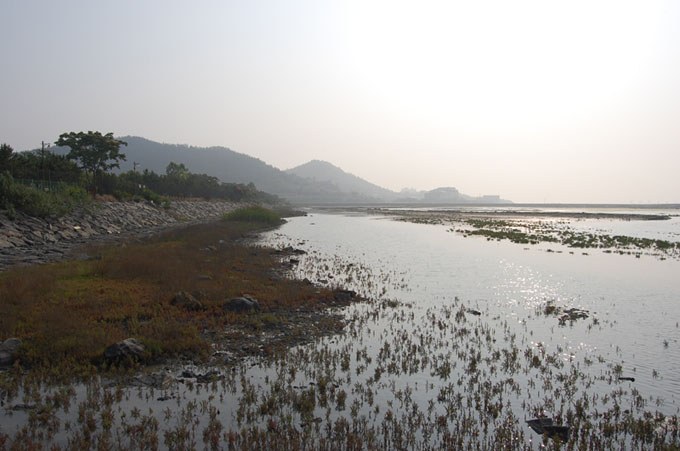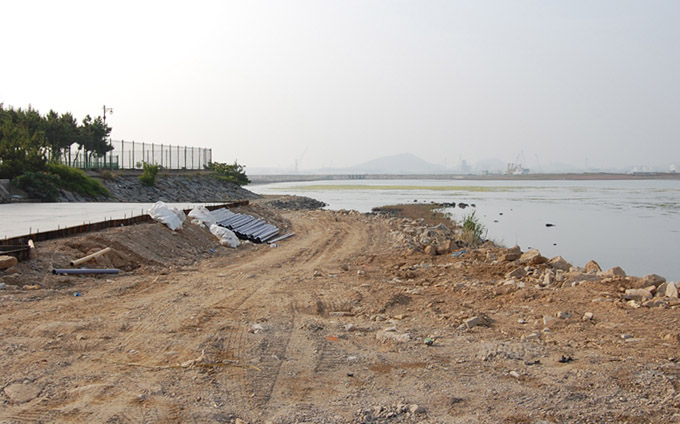As most Birds Koreans know well already, the small but beautiful Mokpo Namhang Urban Wetland has exceptional potential for biodiversity conservation, environmental recreation and environmental education (see: www.birdskorea.org/BK-Startpage.shtml). This is why we have invested much time and energy at the site: in research, in public awareness activities and in developing a basic plan for the wetland that can help to provide environmental, social and economic benefits to Mokpo City and the nation.

Saltmarsh and brackish lagoon (Area “P2”), Mokpo Namhang Urban Wetland.
June 23rd 2012. Nial Moores / Birds Korea.
These three values (environmental, social and economic) are the pillars that together support genuinely sustainable development, in line both with the needs of people and of existing conservation obligations (to Ramsar, CBD and the Millennium Development Goals). Sadly, however, many of the Mokpo wetland’s present and potential values are now threatened by a proposal to construct a huge centre for biodiversity conservation – on a large part of the actual wetland itself. The resultant loss of wetland function and the anticipated decline in biodiversity at the site would clearly render such development unsustainable.

Part of the proposed construction site for the biodiversity centre, Mokpo Namhang Urban Wetland, June 23rd 2012. Nial Moores/Birds Korea.
On June 6th, a small meeting of Birds Koreans and supporters was therefore held at the wetland to discuss future research and public awareness activities (with a further meeting on the same topic to be held in Gwangju on July 2nd). And on June 23rd, two distinguished visitors from overseas also visited: Dr David Cole and Dr Betty Slade. Both are retired economics professors, with a deep understanding of economic systems and processes. Moreover, both are councillors of the Manomet Center for Conservation Sciences in the USA (see: www.manomet.org/about-manomet), and both are concerned about the potential multiple impacts of degradation of the natural resource base – be it in the USA or in the ROK.


Dr Betty Slade (Left) and Dr David Cole (Right) at the Mokpo Namhang Urban Wetland. Present proposals require the infilling of much of the wetland. Nial Moores/Birds Korea.
For Dr Cole, this was his second time in Mokpo. In 1951, his work included trying to help obtain raw materials for local factories in the Mokpo area, so that they could resume production of rubber shoes and other products as part of a US Army program of civil assistance. Awarded for his work at that time by the Provincial Governor of Jeollanam, Dr Cole then went on to write several books, including Korean Development (published by the Harvard University Press in 1971); and Financial Development in Korea, 1945-1978 (published by the Harvard University Asia Center in 1993).
Collaboration with and the insights of economic experts of such standing as Drs Cole and Slade has great value to conservation work. As noted by BirdLife International (in a June 25th press release on the recent UN Conference on Sustainable Development, Rio+20) (www.birdlife.org/community/2012/06/reflections-rio-reaffirming-renewing-rhetoric-anything-really-changed/), the pathway to sustainable development needs to “recognise the value of the three pillars of sustainable development: economic, social and environmental. But the necessary integration of these continues to be held hostage to economic fortune…”
Be it in Mokpo or in Rio, there is an increasingly urgent need to move beyond a focus on short-term economic gain, and on towards a much fuller integration of environmental, social as well as long-term economic values into planning processes and decisions. Everybody’s future depends on it.
Nial Moores, June 27th 2012
